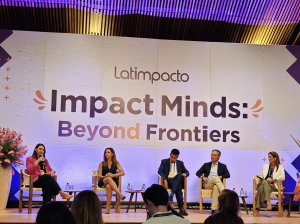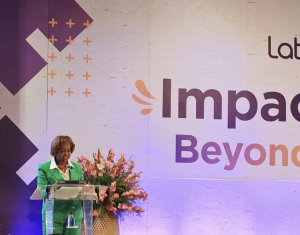From September 10 to 12th, 653 attendees (36% from Mexico, 22% from Colombia, and the rest from other countries), including social investors from 36 countries gathered at the third edition of the Latimpacto Conference in Oaxaca, Mexico.
Through Impact Minds: Beyond Frontiers 2024, Latimpacto brought together prominent leaders and organisations committed to impact investing and social transformation in Latin America and the Caribbean. The event reinforced a key lesson: financial capital alone is insufficient without people. Taking risks is essential to maximise social impact.
The conference addressed ten themes over the three days: bio-economy and climate change, systemic change, business, diversity, equity and inclusion, education, financial innovations, impact measurement and management, migration, technology for the common good, and arts and culture.
During the first day of the conference, eleven visits and learning experiences took place around the Oaxaca area. The visits spanned Women’s communal textile weaving enterprises, social enterprises dealing with inclusive and productive recycling and preservation and reforestation programs designed to sustain cultural heritage.
Lorena Gullie, head of the FEMSA Foundation and Chair of the Conference, presented the importance and relevance of these three days for the region’s future. Three Impact funds were presented during the conference: the Catalytic Green Fund (IDB, Bayer Foundation, and Coca-Cola), the Culture Fund (SURA), and the STEM Fund (Lenovo and Doug Miller).
Day two started with the academic agenda and conferences. The keynote speaker was Natalie Paquin, Chief Operating Officer of the Rockefeller Foundation (RF). Her main message was that the RF invests more than one billion dollars in climate change and focuses on programs and leaders that multiply impact and prosperity.
Since the Latin American region faces enormous challenges to youth social mobility, one of the conferences I attended was on Innovative Youth Prosperity Strategies. We had a panel with representatives from Mexico, Peru, Colombia, Brazil and Spain.
Gabriele da Silva, from the BRF Institute, mentioned that a partnership was formed with the government in five municipalities to focus on youth employment inclusion in Brazil. She emphasised that their work focuses on developing emotional skills and careers in engineering and technology, particularly for women. Vanessa Caldera from Coppel Foundation (Mexico’s largest retail chain) focused on social mobility and employing young people. At the same time, Daniel Uribe from Corona Foundation in Colombia discussed a systemic approach through Global Opportunity Youth Network (GOYN) Colombia, where a financial mechanism study was conducted together with the youth (not for them), monitoring each process alongside young people. Ariadna Bardolet from La Caixa, Spain, emphasised that the success of these initiatives lies in collaboration among social actors. Partnerships between various organisations in Colombia and Peru have created platforms that directly listen to and prototype solutions with young people.
From a territorial perspective, the Anglo-American Foundation has focused on Arequipa, Peru, addressing the gap between labour demand and the available workforce. Their value chain approach is designed to create sustainable jobs and opportunities that reflect market needs.
By focusing on purpose rather than organisational structure, catalytic philanthropy presents itself as a driving force for change, selfless and focused on long-term results.
Another exciting panel was presented by Carmen Corea, Pro Mujer; Lorenzo Mendez Rockefeller Foundation; Natalia Guala Beathyate, Social Group ONCE; Jessica Von Farkas, BMW Foundation; and Giovanni Lepri from ACNUR Mexico, who discussed the importance of diverse voices in spaces of power. These individuals discussed how, as leaders, they promote and amplify the work of others. They explained how they were able to put their power to service, by supporting significantly underrepresented groups, creating inclusion and access by working with these communities, rather than for them. In this way, individuals became a subject of their own transformation rather than an object of development.
 Jessica Von Farkas emphasised that organisations must learn to use power to amplify the voices of others and not only for their own benefit.
Jessica Von Farkas emphasised that organisations must learn to use power to amplify the voices of others and not only for their own benefit.
Lastly, one of the most potent reflections came from Lorenzo Méndez, who stressed that ‘courage and risk-taking are fundamental to creating meaningful change.’
A big question arose: How do you change the culture of diversity in organisations?
They mentioned four main ideas:
- Remove labels and focus on each person and their individuality.
- Invest in modifying circumstances to value the individualities that exist in diversity.
- Empowering employees’ voices and magnifying their contributions leads to buy-in and engagement.
- Mental barriers are the most difficult to change but can be changed with experience and participation.
Catalytic Philanthropy
Catalytic Philanthropy was a panel presented by Sara Aviel, Inter-American Foundation; Roberto Navas, Arturo Sesana Foundation; Pedro Castilla, Promotora Social Mexico; Vanessa Gonzalez, Fomento Social Banamex; and Sandra Ortiz, BMW Foundation.
They all agreed that Catalytic philanthropy presents a renewed approach that aims to transform donations and financial aid. It focuses on active community participation and creates lasting solutions tailored to the specific problems they face. This type of philanthropy promotes community-led initiatives and participatory grant-making; it is a trust-based model that takes equitable decision-making and supports long-term capacity building, not just by providing financial resources but by investing in leadership, infrastructure, and sustainability to empower communities to manage their own initiatives and leveraging a variety of resources (financial, influence, networks, and other types of capital). By focusing on purpose rather than organisational structure, catalytic philanthropy presents itself as a driving force for change, selfless and focused on long-term results.
Perspectives for impact investment in Latin America
In a panel featuring Dalia Silberstein, ESADE Center for Social Impact, Sandra Sainz, Soren Capital, Jan Petter, Financial Sector-IDB invest, and Carolina Suarez Latimpacto, CEO, the growth of financing mechanisms were discussed. However, challenges in terms of time and effectiveness persist. The need for greater consensus on impact measurement systems was highlighted, recognising that, while progress has been made, there is still a long way to go.
Dalia presented the executive summary of the study ‘Transforming great challenges into great opportunities’ by IDB Invest, ESADE, and Latimpacto. This report analyses capital supply trends, types of players, sectors, financial instruments, and collaboration, highlighting challenges and opportunities for the market’s future in the region.
A key aspect discussed was the importance of fostering public-private initiatives and building a strong Latin American narrative. Continuous learning, better coordination between the public and private sectors, and increasing the availability of capital were also emphasised.
Jan noted that despite the advances, it was acknowledged that there is a lack of measurable capabilities and adequate risk assessment tools. Sandra Sainz stressed the importance of informing external audiences and breaking the notion that impact investing is an isolated asset class. She emphasised that any investment can positively impact and highlighted the need to educate about who should participate, mentioning institutional funds, pension funds, endowments, and other regional and international resources.
Doug Miller announces his retirement from the international endeavour
Tying up the conference, Doug Miller announced his retirement from public life and international travel due to family commitments. After creating more than 50 funds, Miller emphasised that the four chapters he helped establish are designed to last.
Agustín Landa is the founder of Landa Zambrano Asociados and Alliance magazine’s Regional Representative in Latin America.







Comments (0)